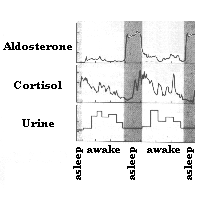
Activity of the immune system, as represented by the number of lymphocytes, also seems to peak in the late evening and is lowest a few hours after the cortisol peak in the morning[5].

Some of the hormones thought to be influenced by the circadian system are growth hormone, prolactin, thyrotropin, and testosterone. One endocrine event clearly under the influence of the clock is the release of the hormone ACTH. The SCN triggers the hypothalamus, which activates the anterior pituitary to release ACTH, causing the adrenal glands to release cortisol and aldosterone. A plot of cortisol concentration in blood plasma shows a characteristic peak in the very early morning (around 6 AM) with a trough right before bedtime. Similarly, aldosterone level is constantly high throughout the night and low throughout the day[4].

Activity of the immune system, as represented by the number
of lymphocytes, also seems to peak in the late evening and is lowest
a few hours after the cortisol peak in the morning[5].
The timing of the endocrine and immune systems are clearly intermeshed. It is known that aldosteone and cortisol suppress the immune system, while melatonin appears to enhance it.